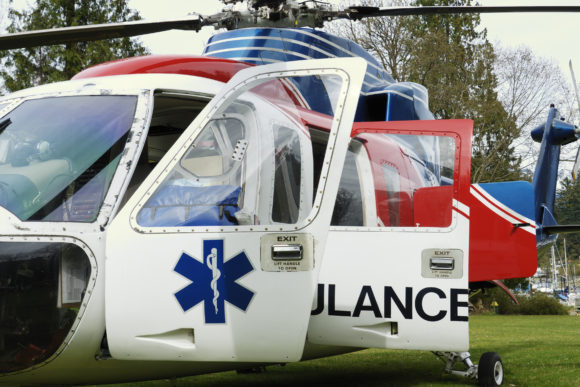A 2020 decision by the Supreme Court of Texas that limits workers’ compensation air ambulance payments to what is “fair and reasonable,” has been allowed to stand by the U.S. Supreme Court, according to workers’ compensation insurer Texas Mutual.
The company said there “has been a drastic increase in air ambulance prices since 2012 when large private equity companies that had acquired air ambulance operations began increasing their billed charges dramatically. At the same time, these companies argued in courts in Texas and around the nation that a federal law requires state-regulated workers’ compensation insurers to pay any price they demand.”
The insurer said in a statement that the “average billed charge today exceeds $50,000 for a single transport.”
Texas Mutual, along with other insurance companies, and the Texas Attorney General’s office have been fighting the price increases in years.
The insurers scored a win last year when, in an opinion released in July 2020, the Texas Supreme Court held in Texas Mutual Insurance Co., et al, v. PHI Air Medical Inc., that the Texas Workers’ Compensation Act (TWCA) and Division of Workers’ Compensation Rules, which require reasonable reimbursement to privately owned air ambulance services, are not preempted by federal law.
In the Texas Supreme Court’s majority opinion, Justice Brett Busby, wrote that the case is “about federalism.”
He said the court looked at whether a federal law deregulating aviation services may override a state’s authority to “require that private insurance companies reimburse the fair and reasonable medical expenses of injured workers” and “require Texas to mandate reimbursement of more than a fair and reasonable amount for air ambulance services.”
The Texas justices said “no” in both cases.
PHI Air Medical petitioned the U.S. Supreme Court for reversal of the Texas Supreme Court’s decision. The U.S. Supreme Court declined, however, to review the case, Texas Mutual said.
“The issue has now been fully and fairly litigated,” Mary Nichols, senior vice president and general counsel for Texas Mutual, said in a media release. “Without regulation, air ambulances would drain tens of millions of dollars from the workers’ comp system and ultimately from Texas employers and injured workers. These rulings affirm the role of the states in regulating their own workers’ compensation systems, as a matter of federalism and sound regulatory policy.”
Was this article valuable?
Here are more articles you may enjoy.



 ‘Structural Shift’ Occurring in California Surplus Lines
‘Structural Shift’ Occurring in California Surplus Lines  AIG’s Zaffino: Outcomes From AI Use Went From ‘Aspirational’ to ‘Beyond Expectations’
AIG’s Zaffino: Outcomes From AI Use Went From ‘Aspirational’ to ‘Beyond Expectations’  Florida Engineers: Winds Under 110 mph Simply Do Not Damage Concrete Tiles
Florida Engineers: Winds Under 110 mph Simply Do Not Damage Concrete Tiles  Portugal Deadly Floods Force Evacuations, Collapse Main Highway
Portugal Deadly Floods Force Evacuations, Collapse Main Highway 

